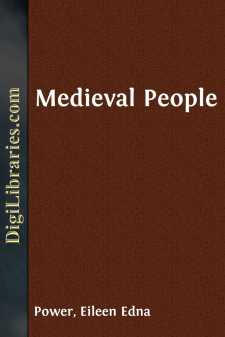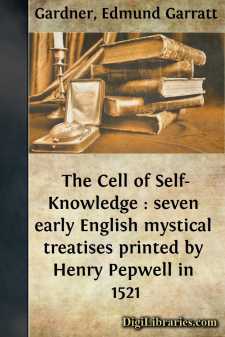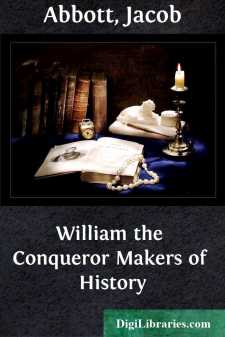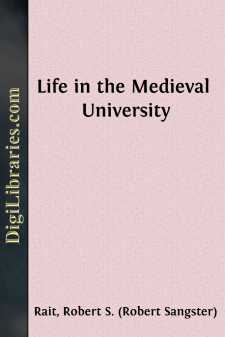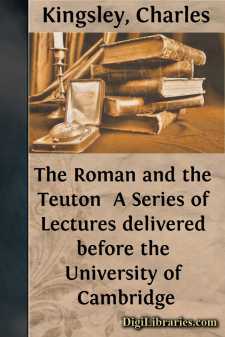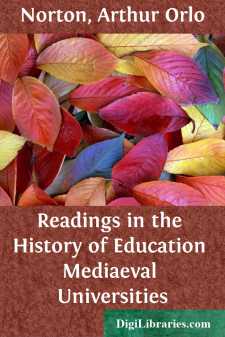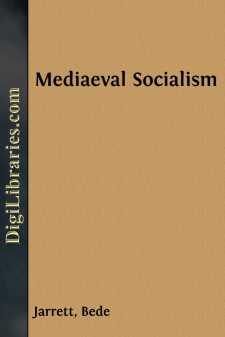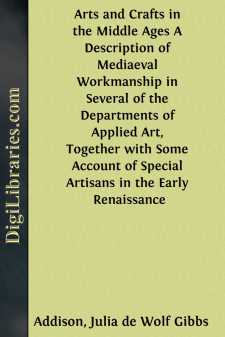History
- Africa 30
- Americas (North Central South West Indies) 50
- Ancient 68
- Asia 58
- Australia & New Zealand 8
- Canada 41
- Caribbean & West Indies 1
- Civilization 20
- Eastern Europe 12
- Europe 310
- Expeditions & Discoveries 60
- General 77
- Historical Geography 1
- Jewish 9
- Latin America 3
- Medieval
- Middle East 14
- Military 248
- Revolutionary 8
- Study & Teaching 5
- United States 353
- Western Europe 56
- World 13
Medieval Books
Sort by:
CHAPTER I The Precursors Every schoolboy knows that the Middle Ages arose on the ruins of the Roman Empire. The decline of Rome preceded and in some ways prepared the rise of the kingdoms and cultures which composed the medieval system. Yet in spite of the self-evident truth of this historical preposition we know little about life and thought in the watershed years when Europe was ceasing to be Roman...
more...
FROM the end of the thirteenth to the beginning of the fifteenth century may be called the golden age of mystical literature in the vernacular. In Germany, we find Mechthild of Magdeburg (d. 1277), Meister Eckhart (d. 1327), Johannes Tauler (d. 1361), and Heinrich Suso (d. 1365); in Flanders, Jan Ruysbroek (d. 1381); in Italy, Dante Alighieri himself (d. 1321), Jacopone da Todi (d. 1306), St. Catherine...
more...
by:
Jacob Abbott
Chapter I. A.D. 870-912The Norman Conquest.Claim of William to the throne.The right of the strongest.One of those great events in English history, which occur at distant intervals, and form, respectively, a sort of bound or landmark, to which all other events, preceding or following them for centuries, are referred, is what is called the Norman Conquest. The Norman Conquest was, in fact, the accession...
more...
INTRODUCTORY "A Clerk ther was of Oxenford also,That unto logik hadde longe y-goAs lene was his hors as is a rake,And he was not right fat, I undertake;But loked holwe, and therto soberly,Ful thredbar was his overest courtepy,For he had geten him yet no benefyce,Ne was so worldly for to have offyce.For him was lever have at his beddes heedTwenty bokes, clad in blak or reed,Of Aristotle and his...
more...
by:
Charles Kingsley
PREFACE Never shall I forget the moment when for the last time I gazed upon the manly features of Charles Kingsley, features which Death had rendered calm, grand, sublime. The constant struggle that in life seemed to allow no rest to his expression, the spirit, like a caged lion, shaking the bars of his prison, the mind striving for utterance, the soul wearying for loving response,—all that was...
more...
I INTRODUCTION The history of education, like all other branches of history, is based upon documents. Historical documents are, in general, "the traces which have been left by the thoughts and actions of men of former times"; the term commonly refers to the original records or sources from which our knowledge of historical facts is derived. The documents most generally used by historians are...
more...
by:
Bede Jarrett
INTRODUCTION The title of this book may not unnaturally provoke suspicion. After all, howsoever we define it, socialism is a modern thing, and dependent almost wholly on modern conditions. It is an economic theory which has been evolved under pressure of circumstances which are admittedly of no very long standing. How then, it may be asked, is it possible to find any real correspondence between...
more...
The very general and keen interest in the revival of arts and crafts in America is a sign full of promise and pleasure to those who are working among the so-called minor arts. One reads at every turn how greatly Ruskin and Morris have influenced handicraft: how much these men and their co-workers have modified the appearance of our streets and houses, our materials, textiles, utensils, and all other...
more...


